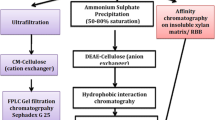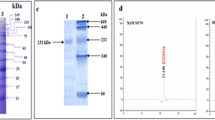Abstract
Bacillus circulans AB 16 was able to produce 50 IU/ml of xylanase, with negligible cellulase activity when grown on untreated wheat straw. The pH optimum of the crude enzyme was 6–7 with a temperature optimum of 80 ∘C. The enzyme showed high pH and thermal stability retaining 100% activity at 60 ∘C, pH 8 and 9 after 2.5 h of incubation. The residual activity at 70 ∘C after 2.5 h was 62% and 45% at pH 8 and 9, respectively. At 75 ∘C only 22.2% activity remained at pH 8 after 1 h incubation. Since Kraft pulp is alkaline this enzyme could be used for prebleaching of pulp at temperatures up to 70 ∘C without pH adjustment.
Similar content being viewed by others
References
Dhillon, A. 1999 Regulation, purification and properties of a thermostable alkalitolerant endo 1,4-β-D-xylanase produced by Bacillus circulans. PhD Thesis. Punjab University, Chandigarh.
Gessesse, A. & Gashe, B.A. 1997 Production of alkaline xylanase by an alkaliphilic Bacillus sp. isolated from an alkaline soda lake. Journal of Applied Microbiology 83, 402-406.
Itzhaki, R.F. & Gill, D.M. 1964 A microbiuret method for estimating proteins. Analytical Biochemistry 9, 401-410.
Lal, B. & Khanna, S. 1996 Degradation of crude oil by Acinetobacter calcoaceticus and Alcaligenes odorans. Journal of Applied Bacteriology 81, 355-362.
Miller, G.L. 1959 Use of dinitrosalicylic acid reagent for determination of reducing sugars. Analytical Chemistry 31, 426-428.
Nakamura, S., Wakabayashi, K., Nakai, R. & Horikoshi, K. 1993 Production of alkaline xylanase by a newly isolated alkaliphilic Bacillus sp. strain 41 M-1. World Journal of Microbiology and Biotechnology 9, 221-224.
Park, Y.S., Yum, D.Y., Bai, D.H. & Yu, J.H. 1992 Xylanase from alkaliphilic Bacillus sp. YC-335. Bioscience Biotechnology and Biochemistry 56, 1355-1356.
Pham, P.L., Taillander, P., Delmas, M. & Strehaiano, P. 1998 Production of xylanases by Bacillus polymyxa using lignocellulosic wastes. Industrial Crops and Products 7, 19-203.
Rajaram, S. & Varma, A. 1990 Production and characterisation of xylanase from Bacillus thermoalkalophilus grown on agricultural wastes. Applied Microbiology and Biotechnology 34, 141-144.
Viikari, L., Panua, M., Kantelinen, A., Sundquist, J. & Linko, M. 1986 Bleaching with enzymes. In Proceedings of the Third International Conference on Biotechnology in the Pulp and Paper Industry, Stockholm, pp 67-69.
Wizani, W., Esterbauer, H., Steiner, W. & Gomes, J. 1990 Verfauzer Herstellung exo-und endocellulasefreier xylanase, A patent 1030/90.
Yang, V.W., Zhaung, Z., Elegir, G. & Jeffries, T.W. 1995 Alkaline active xylanase produced by an alkaliphilic Bacillus sp. Isolated from kraft pulp. Journal of Industrial Microbiology 15, 434-441.
Zamost, B.L., Nielson, H.K. & Starnes, R.L. 1991 Thermostable enzymes for industrial applications. Journal of Industrial Microbiology 8, 71-82.
Author information
Authors and Affiliations
Rights and permissions
About this article
Cite this article
Dhillon, A., Khanna, S. Production of a thermostable alkali-tolerant xylanase from Bacillus circulans AB 16 grown on wheat straw. World Journal of Microbiology and Biotechnology 16, 325–327 (2000). https://doi.org/10.1023/A:1008911026606
Issue Date:
DOI: https://doi.org/10.1023/A:1008911026606




